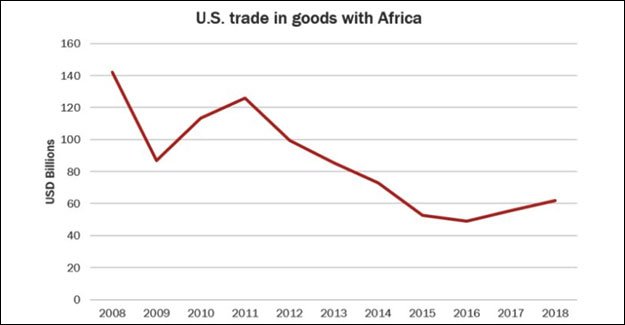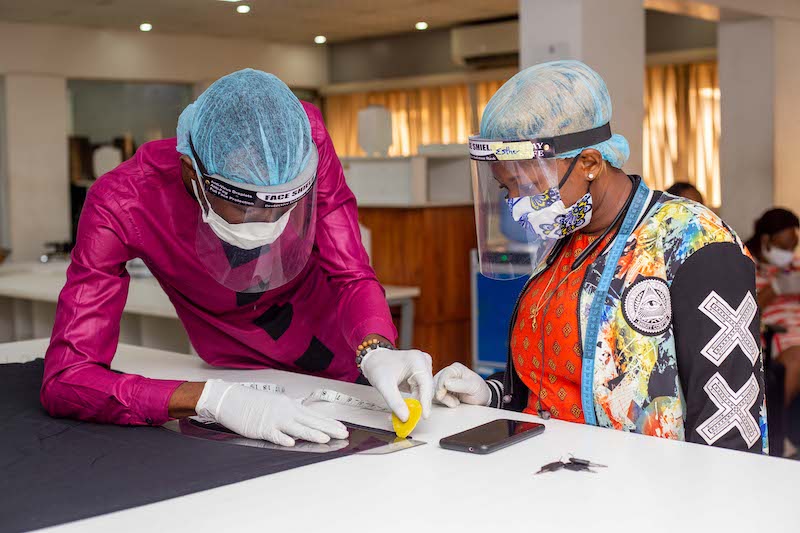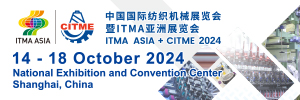The new African Continental Free Trade Agreement (AfCFTA) will bring economic development across the continent, as well as significant opportunities for US companies looking to do business there.
The United States should negotiate a Free Trade Agreement (FTA) with Africa.
African countries integrate under the AfCFTA, their economies will prosper and they will be eligible to graduate from the African Growth and Opportunity Act(AGOA) programme. Eventually, AGOA will be folded into the US-AfCFTA Free Trade Agreement.
The US government should aggressively support American companies hoping to access African markets.
The advent of the AfCFTA completely transforms trade between Africa and rest of the world. The United States must now forge an innovative and robust business relationship with Africa, with the goal of an eventual FTA.

The new AfCFTA offers immeasurable development opportunities for Africa – an upsurge of American companies will mean increased capital flows, technology transfer, employment opportunities and access to the US market, and much more for Africans. And it will open markets for American companies across the continent that were previously too difficult to access. In so doing, it will create US jobs, augment US overseas markets and boost revenue flowing back to the United States.
The AfCFTA launches on January 1, 2021, with selective tariff reductions. It builds on harmonisation and integration work done in Africa’s regional economic entities in recent decades.

Under the AfCFTA, countries across Africa will unite their economies into an enormous continent-wide trading block – estimated to comprise anywhere from US$ 2-4 trillion in consumption and investment. A Secretariat has been established in Ghana and work to harmonise regulations, reduce tariffs, eliminate non-tariff barriers, promote free movement of persons across the continent and more – has begun. The eventual goal is a continent-wide, single trading entity.
The first task of the AfCFTA will be focused inward – to merge the economies of the continent. Benefits to African countries will include broadening and integrating supply chains, increased innovation, enhanced competition and productivity and more. Smaller countries will be given opportunities to catch up with their larger, richer and more economically diversified neighbours.
The AfCFTA’s second task will be outward focused – the eventual establishment of economic relations with the rest of the world as a single, continent-wide entity. The economic potential of a unified Africa will be considerable, and its desire to negotiate trade agreements of intense interest to trading partners.
The US should consider FTA with Africa
The United States should make a US-AfCFTA Free Trade Agreement its goal (the European Union is already referencing a continent-to-continent FTA in the future). The AfCFTA will bring significant opportunities for foreign companies looking to do business with Africa; American firms will be able to establish in one country and expand operations across national borders.

The AfCFTA will take time to be implemented, the United States should along the way:
Refrain from negotiating bilateral agreements with individual African countries – they undermine the objective of a unified Africa and risk alienating the rest of the continent;
Seek assurances from the Africans that the US will not be disadvantaged by the European Union’s (EU) Economic Partnership Agreements (EPAs). (Indeed, it is not clear whether the EPAs will benefit the EU and Africa given the greater potential of the AfCFTA; in any case few of them have been implemented);
Ensure that American companies will be able to take full advantage of the provisions of the AfCFTA as they are implemented; and Offer to work with the new AfCFTA Secretariat at the technical level as tariffs are reduced and the Agreement itself is deepened to include additional trade-related disciplines.
No discussion of US-Africa trade would be complete without a discussion of AGOA. AGOA is a 20-year-old program created by Congress that has enjoyed broad bipartisan support and is in place until 2025. AGOA grants duty-free entry for 6500 products into the United States from Africa.
AGOA has long been referred to as “the cornerstone of US-Africa trade policy.” However, AGOA addresses only one half of the trade equation – exports from Africa to the United States. AGOA was never equipped to assist US businesses looking to invest in, or trade with, Africa. That must be done through other means.
As the AfCFTA stands up, AGOA will wind down
Countries “graduate” out of AGOA if they are determined to be “high income economies” as defined by the World Bank. Seychelles achieved this status and was graduated from AGOA in 2017; Mauritius was recently determined to have met this benchmark and presumably will be graduated as well.
As countries begin to prosper from measures undertaken through the AfCFTA, more of them will reach “high income status” and therefore be graduated out of the AGOA program. Over time, the number of beneficiary countries should steadily decline.
FTAs are designed to reduce and/or eliminate tariff and non-tariff barriers between (or among) countries. As is the norm, an FTA with the AfCFTA would set all policy with respect to tariffs, resulting in AGOA being superseded and disappearing.

















